In adult cats, as you might guess, an already formed character. If you pick up an adult wild cat from the street, expecting that in a couple of weeks he will purr on your shoulder is somewhat premature. And yet everyone wants a calm, affectionate pet to live at home without frightening aggression.
It is still unclear exactly what affects the character of the cat: environment or genetics. But there is a high probability that the offspring of an affectionate, calm cat will also be complaisant. Therefore, it is so important to know whose baby you are bringing up.
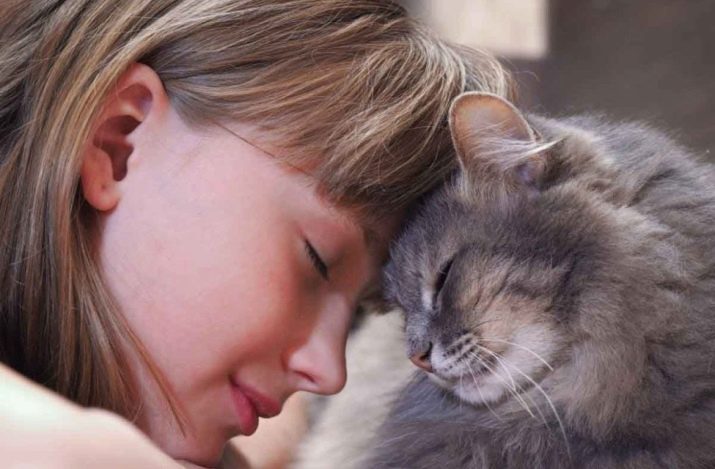


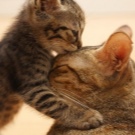


Early communication
It is understood as communication between a kitten and a person. But you need to clearly understand that until the baby is 8 weeks old, it is impossible to separate him from his mother. Eight weeks is the minimum time to start socialization. At this time, the cat is ready to learn game as well as hunting skills, he can learn good grooming behavior, and is ready to learn the norms of behavior in the cat community. Finally, 8 weeks is the kitten’s willingness to feel confident. Those babies who have been separated from their mother too early have excessive aggression. To make an affectionate cat very hard.
The kittens that have separated from their mothers are aggressive, shy, distrustful, and also emotionally unstable. Aggression is the most difficult case, since such a cat has little chance of becoming kind and accommodating. But the early separation from the cat mom can be compensated!

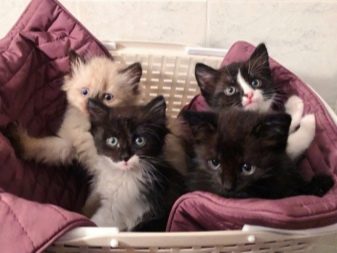
Consider what the owner needs to do.
- Taking a kitten, create an environment around him that will not change every day. They say that the dog gets used to the owner, and the cat - to the house. There really is a lot of truth.If in his room (more precisely, in the one where he most often happens), everything changes, if you constantly offer him new beds and toys, he will be confused. Then confusion will be replaced by wariness, and there, and aggression is not far.
- You can accustom a cat to affection and complaisance only if the person himself is calm, predictable for the cat, stable. Like it or not, but without this it is impossible to achieve the desired. It is necessary that the pet ceases to be afraid of you, that it responds well to your voice, knows your habits, etc.
This can be achieved precisely through early communication. Even if the baby is still completely absurd, just mastered in a new environment for him, become his friend. Let him associate you with your house, to which he will stick to, of course, a little more.

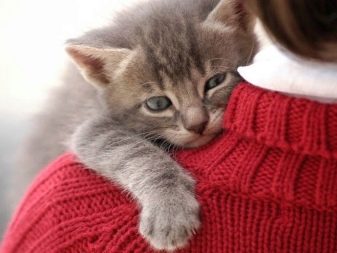
Can a cat be punished?
Making a pet obedient by physical punishment will not work. Unlike a dog, which perceives punishment as an incentive to obedience, a cat definitely does not accept this. For some reason, many believe that you can teach a cat and a dog obedience using the same methods. But the cat and the dog have only one thing in common - they can live next to the person, but they have huge differences. Because what is good to apply to the dog, the cat will not tolerate.
- The cat is unable to perceive direct prohibitions. It is necessary to negotiate with it, to propose an alternative. She simply doesn’t understand “impossible”. When a little cat does something wrong, mom easily hits him on the nose with a paw and purrs, purrs, explains to his feline what he has done. Pick up this trick if the kitten, for example, is crap in the corners. But without screams and real beatings.
- The pet must have the right to choose, no matter how strange it may sound. No need to force him to make contact with the guests, this will only exacerbate the behavior. In principle, you don’t need to be obsessive with a cat - observe its habits, notice its features, try to help where it is possible.
If the house has an older cat, she can assume the role of teacher. And it works better than human education. If the older cat is calm, affectionate, then her "pupil" is more likely to become the same.
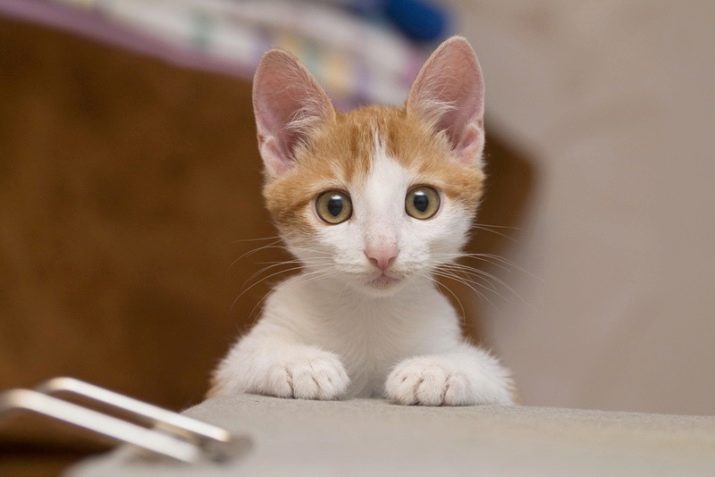
The mental needs of animals
There is such a science - zoopsychology, which studies the behavior of animals. In part, it can provide an answer to the question of how to make the kitten affectionate. If you delve deeper into the topic, you will learn a lot of interesting things about the psychic needs of cats. For example, a cat is incapable of serving a person, unlike a dog, but it can live comfortably and comfortably next to a person. Close (relatively close, sometimes quite remote) contact for a cat is possible.
When they say that a cat is an animal walking on its own, this does not mean that the mental need of the pet is loneliness. This means that the cat needs a framework, a border beyond which it will not let anyone in.
Understanding this will allow you to get to know your pet better. No need to demand from him the impossible: a manual cat will still never be faithful, like a dog. But he can live near you, observing a certain distance.

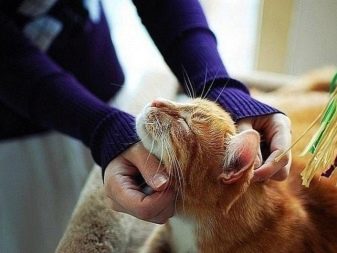
The period of early socialization is the age of a cat from three to eight weeks. It is called sensitive (or sensitive). This is a good time to learn social skills, to build character. At this age, you need to communicate with a kitten, if you have such an opportunity. You give her a toy - the cat gets used to it. You select a toy, it may not accept it. This creature is very dependent on habits, on established traditions. If you fed a cat at an unspecified time, if you have strangers at home, if you even rearranged furniture, the cat may begin to get nervous.
It is for this reason that the kitten that appeared at home should be calm from the fact that everything is stable, all toys, stove benches, claws, a tray in place.
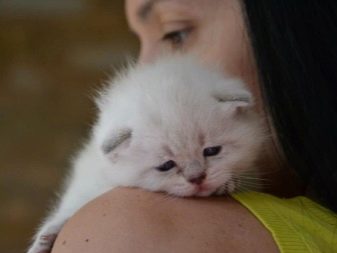

Secrets of parenting
Felinologists say that a very affectionate cat is a well-fed cat.Talking about feeding a pet is out of the question, but if your animal is starving, you can’t wait for affection from him. In no case do not interfere with the food process, this is an intimate process for a cat (and for any creature, in principle). No need to feed the animal if your kitchen is crowded, noisy and loud.
- A very affectionate kitty is an animal that receives a lot of attention. If you shrug off the pet, if you are not ready to stroke it once again, do not bother talking with the cat, then do not wait for a response. Hug, watch TV together, read the newspaper together - take a break with the cat.
- To make the animal tame, you can not drag it in your arms. Paradoxically, it is. I want to stroke the little cutie-kitten, take it on the handles, but why? He does not need this, he loves distance, and if he wants attention, he will definitely show it. Taking it in your hands once again, you limit its movements - the cat will not like it. If you take the cat in your arms, then so that it has the opportunity to leave at any time: one arm under the chest, the other - stroking the animal.
- The animal escapes from danger by climbing to a height. Planting a tree at home is unlikely to succeed, but you can arrange different houses and ladders higher. In case of stress, the cat will climb there, feeling safe. This means that stress will be less when he has shelter.
- Games are more important than toys. To make the kitten affectionate, it is not enough to buy him bright springs and luminous balls. You need to play with him, have fun, attract all households to game contact with the baby. Playing together, you begin to understand each other, the very possible closeness of man and animal is formed.
- Taboo is your arms or legs like a toy. As soon as you start tapping your fingers, twitch your foot, the cat includes a hunter and attacks. Get ready for permanent scratches. In this sense, you cannot call a wild beast in a cat. But if in the heat of the game the cat nevertheless attacked you, do not pull your hand out. Freeze, look at the little rascal without a smile, you can even hiss — he will let go of his hand. And probably will not attack again.



Breeders do not accidentally let all cats with an unstable psyche out of breeding, they do not want to risk business, no matter how pragmatic it sounds. If you took a cat from the street, and he already saw how his mother drives away all idle passers-by from him, it is almost impossible to cope with this wildness. Echoes will still be. Although it’s easier with the kids - their “personality” is still being formed, and you can influence the situation.
Before taking a kitten, watch his mom. You should not buy a "pig in a poke" without knowing anything about his mom, about the conditions where he lived the first weeks of his life. At least, if you are not ready to deal with his severe temper in the future.
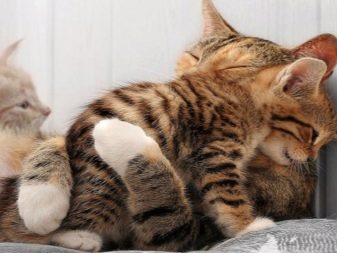

For tips on keeping a kitten in the house, see the next video.


































